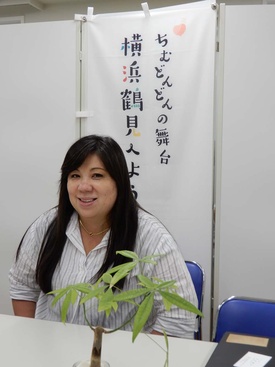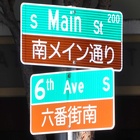Tsurumi Ward, Yokohama City: A city of multicultural coexistence
Tsurumi-ku, Yokohama, is the main setting for the NHK drama series "Chimudondon," which began airing in April this year. As shown in the drama, the area has long been known throughout Japan as a place with a community of Okinawans, but it is also home to a community of Japanese-Brazilians with roots in Okinawa and other Japanese-Brazilians with ties to South America.
In addition, there are many people of foreign origin, including Chinese, Filipino, and Vietnamese, making it a unique area in which approximately one in every 20 residents is of foreign nationality. The ward is dotted with Okinawan and South American restaurants and shops, and the local residents, both Japanese and foreign, interact with each other across cultural and customary barriers, putting into practice the "multicultural coexistence" that has become so common in recent years.
However, there are many residents whose first language is not Japanese, and they face various obstacles in their daily lives. There are also issues regarding their children's education, and on a personal level, some people have identity issues.
While the local government has been quick to provide resident services and assistance tailored to these circumstances, another organization tackling these issues at the private level is the nonprofit organization ABC Japan. Founded in 2000 by Japanese-Brazilians living in Tsurumi Ward, the organization became an NPO in 2006. Based on the principle that "Japanese and foreigners support each other as people living in the same town," the organization is particularly involved in projects that lend a hand in resolving the problems faced by foreign residents.
From Okinawa to Brazil and Tsurumi
The chairperson of ABC Japan is Michie Afuso, a Japanese-Brazilian who has lived in Tsurumi for nearly 30 years. She was born in 1968 in São Paulo, the city with the largest Japanese population in Brazil, and followed her brother to Japan in 1987. She worked in Isesaki, Gunma Prefecture, and moved to Tsurumi about two years later.
"At first I thought I would return home after two years, but after three months I changed my mind. When I was in Brazil I was getting by thanks to my parents, but when I came to Japan I was able to live on my own, which I enjoyed and decided I wanted to stay in Japan forever," says Yasufuso.
Yasufuso's parents are from Onna Village, Okinawa Prefecture, and his father Hideyoshi became interested in South America from his junior high school days due to his teacher's influence, and joined the immigration club in high school. After graduating from high school, he began preparing to emigrate to South America. He initially wanted to emigrate to Bolivia, but because of the condition that family members must emigrate, he went to Brazil.
He started growing vegetables locally and eventually became independent, and in 1963 he brought over his wife from Okinawa and the couple worked on growing vegetables. He then bought the rights to a fera (open-air market) where he made and sold pastel (a Brazilian dish of deep-fried thin pastry stuffed with cheese and meat), which he continued to do until 2010.
Hideyoshi and his wife had two sons and one daughter, the eldest son lives in Brazil, while the second son and the eldest daughter, Michie, came to Japan. The second son was naturalized and became a Japanese citizen shortly after arriving in Japan, but Yasufuso's nationality is Brazilian. Yasufuso's parents supported and supported his decision to go to Japan.
Embracing Japanese culture
After moving to Tsurumi, Yasufuso worked as an agent for KDDI, handling international phone calls and setting up the Internet, but he also had many Brazilian customers, and began to receive a variety of enquiries outside of work.
Due to the revision of the Immigration Control Act in 1990, many Japanese people from Brazil and other South Americans came to Japan to work at that time, and in Tsurumi, which already had a large Okinawan population, Okinawan and South American Japanese people naturally gathered there, relying on their relatives and acquaintances.
"These Japanese South Americans often came to visit, but they had trouble because they couldn't speak Japanese. Most of them work in demanding, dangerous jobs and don't have time to study, making it difficult for them to improve their Japanese. They also had many questions about everyday life, such as how courier services work, so they began to give advice on these matters as volunteers, but there are limits to what volunteering can do, so I founded ABC Japan together with a Japanese Brazilian I met at the store. A man who had previously been stationed in Brazil as a Japanese company employee also helped out. The reason we named it ABC is because it is about the beginning of things," says Yasufuso, explaining the background to the company's founding.
Identity is a place
Among the various issues, ABC Japan has focused on providing support for the education of foreign and Japanese children who are not yet assimilated into Japanese society. Yasufuso himself felt the need for this support from his own experience of raising two children in Japan.
In 1993, Yasufuso married a Brazilian of Japanese descent like himself and had two daughters. However, when it came to educating his eldest daughter, he had many questions.
"What was difficult was that the education system was different. I was like, 'What is a cram school?' I didn't really understand the meaning of the handouts handed out at school, and I didn't know how to do my homework, such as reading aloud or learning multiplication tables. My eldest daughter seemed to do it on her own, which caused me a lot of hardship. However, at times like that, Japanese mom friends from her nursery school helped me out."
To help explain the school system in an easy-to-understand way, ABC Japan has created school guides in five languages: English, Portuguese, Spanish, Chinese, and Tagalog, for elementary, junior high, and high schools. They also provide guidance on entering university and guides on jobs for entering society. They also run a free school for foreign and Japanese children who have a lower rate of going on to higher education than regular Japanese junior high school students due to language barriers and other reasons.
In addition to this practical support, psychologists also provide counseling for "mental care."
"Some children are confused as to why they are Brazilian even though they were born in Japan," says Yasufuso, and some Japanese people have inner conflicts about their identity. For example, some second-generation Japanese who came to Japan, their roots, as "migrant workers" are confused by the language and cultural barriers, unable to adapt and returning home, or returning home with no place to belong, while others want to return home but choose to stay in Japan to make a living.
"You won't get along unless you accept Japanese culture and learn the Japanese language. Communication is important. And you have to get along with the people around you. In that respect, Tsurumi is a great place. There are issues of identity, but I think identity is where you belong. That's why I'm a 'Tsurumi person,'" Yasufuso says with a laugh.
To put it another way, Yasufuso's aim may be to increase the number of people who feel that Tsurumi is their home, in other words, the number of "Tsurumi people."
© 2022 Ryusuke Kawai







